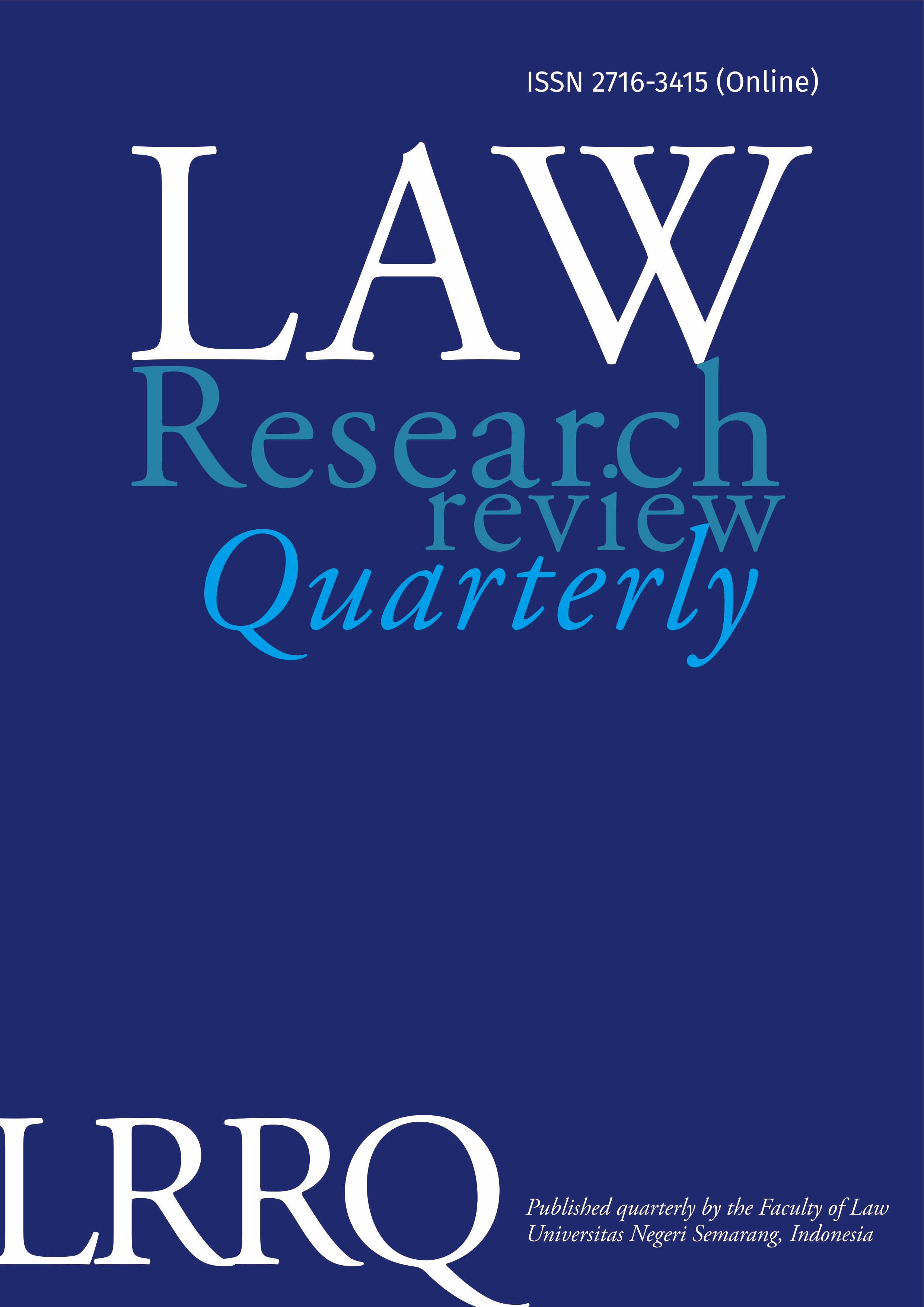The Urgency of Global Halal Standards on Products in Supporting International Trade
Main Article Content
Abstract
This research endeavors to assess the imperative need for global halal standards in product certification within the regulatory frameworks of diverse countries. Employing normative juridical research methods alongside statutory, comparative, and conceptual approaches, the study seeks a comprehensive understanding of the existing landscape. The findings underscore significant disparities among halal certification bodies across various countries, attributable to variations in regulations, diverse schools of thought, cultural influences, and nuanced considerations of maslahah (public interest). These divergences necessitate urgent attention and intervention. It becomes apparent that the Standards and Metrology Institute for the Islamic Countries (SMIIC) holds a pivotal role in harmonizing global halal standards. Such harmonization is critical not only to safeguard the interests of Muslim consumers on a global scale but also to mitigate potential international trade disputes arising from the export and import of halal products. This research underscores the pressing need for concerted efforts to establish unified global standards, ensuring the integrity of halal certification processes and fostering a more transparent and equitable global trade environment for halal products. The study contributes to the ongoing discourse on harmonization and standardization within the halal industry, emphasizing the potential for enhanced consumer protection and international trade facilitation.
Article Details

This work is licensed under a Creative Commons Attribution-ShareAlike 4.0 International License.
All writings published in this journal are personal views of the authors and do not represent the views of this journal and the author's affiliated institutions. Author(s) are retain the copyrights of the Article. However, before publishing, it is required to obtain written confirmation from Author(s) in order to ensure the originality (Author Statement of Originality). The statement is to be signed by at least one of the authors who have obtained the assent of the co-author(s) where applicable.This work licensed under a Creative Commons Attribution-ShareAlike 4.0 International (CC BY-SA 4.0)
References
Adolf, H. (2011). Aspek-Aspek Negara dalam Hukum Internasional. Bandung: Keni Media.
Akbar, H., & Abdullah, N. (2017). Comparison and Challenges in Implementing Halal Food Laws in Malaysia, the Nederlands, and the United States of America. Osaka: Osaka University.
Alharbi, Y. (2015). Halal Food Certification, Regulations, Standards, Practices, in the Nederlands. Wageningen University and Research Centre, pp. 55–70.
Aliasar, A. (2021, Juli 29). Indonesia Negara Pelopor Data Perdagangan Produk Halal Terintegrasi. Retrieved from Komite Nasional Ekonomi dan Keuangan Syariah: https://knks.go.id/isuutama/24/indonesia-negara-pelopor-data-perdagangan-produk-halal-terintegrasi
Ariadni, M. K. (2008). Kedudukan Hukum Internasional dalam Sistem Hukum Nasional. Jurnal Hukum Internasional, 1-15.
Armanios, F., & Ergene, B. (2018). Halal Food: A History. London: Oxford University Press.
Battour, M., & Ismail, M. N. (2016). Halal Tourism: Concepts, Practices, Challenges, and Future. Tourism Management Perspectives, 150-154.
Batu, A., & Regenstein, J. M. (2014). Halal Food Certification Challenges and Their Implications for Muslim Societies Worldwide. Turkish Studies Journal, 127.
Bea Cukai. (2022, Desember 23). Bea Cukai Kenalkan Kode 952 untuk Kodifikasi Produk Halal Ekspor. Retrieved from https://www.beacukai.go.id/berita/bea-cukai-kenalkan-kode-952-untuk-kodifikasi-produk-halal-ekspor.html
COMCEC Coordination Office. (2016). Progress Report on the Implementation of the COMCEC Strategy. COMCEC.
Dinar Standard. (2022). Global Islamic Economy Report Unlocking Opportunity. Dubai: Dinar Standard.
Featherstone, S. (2015). A Complete Course in Canning and Related Processes. Fundamental Information on Canning, p. 22.
Fogt, M. (2012). Unification and Harmonization of International Commercial Law. Kluwer Law International Book.
Goesniadhie, K. (2006). Harmonisasi Hukum dalam Perspektif Perundang-undangan. Lex Specialis Suatu Masalah, 106.
Harahsheh, S., Haddad, R., & Alshorman, M. (2020). Implications of Marketing Jordan as a Halal Tourism Destination. Journal of Islamic Marketing, 97-116.
Indah. (2022, November 27). Jadi Bagian SMIIC, Indonesia Ikut Susun Standar Halal Global. Retrieved from https://kemenag.go.id/read/jadi-bagian-smiic-indonesia-ikut-susun-standar-halal-global-jjlnj
Jayanti, L. M., & Ariana, I. G. (t.thn.). Penyelesaian Sengketa Impor Daging Ayam antara Brazil dengan Indonesia melalui Dispute Settlement Body World Trade Organization. 1-12.
JR, H. (1997). A New Handbook of Living Religions. London: Penguin.
Khoiriyah. (2021). Urgensi Labelisasi halal Daging Impor di Indonesia. Jurnal Al-Qardh, 52-66.
Koeswinarno, d. (2020). Sertifikasi Halal Yes or No. Jakarta: Litbangdiklat Press.
KPMG. (2018). ASEAN Business Guide: The Economies of ASEAN and the Opportunities They Present. Retrieved from https://assets.kpmg.com/content/dam/kpmg//sg/pdf/2018/07/ASEAN-Business-Guide-COMPLETE.pdf
Lukito, R. (2019). Perbandingan Hukum: Perdebatan Teori dan Metode. Yogyakarta: Gadjah Mada University Press.
Marzuki, P. M. (2014). Penelitian Hukum. Jakarta: Prenada Media Group.
Najiha, A. (2009). Determenation of Halal Limits for Alcohol Content in Foods by Simulated Fermentation. International Symposium on Halal Science and Management. Malaysia: Halal Product Reseaerch Instutute Universiti Putra Malaysia.
Osman, M. N. (2018). The Secular and the Religious in the Management of Islam in Singapore. Journal of Muslim Minority Affairs, pp. 1–18.
Penyusun, T. (2009). Pengantar Standarisasi. Jakarta: Badan Standarisasi Nasional.
Rahayu, I. R. (2020, Oktober 7). Ekspor Produk Halal RI Baru 3,8 Persen Total Pasar Produk Halal Dunia. Retrieved from https://money.kompas.com/read/2022/10/07/063000526/ekspor-produk-halal-ri-baru-3-8-persen-total-pasar-produk-halal-dunia
Ravi, R., & Kusniadji, S. (2018). Komunikasi Isu Krisis PT. Korinus untuk Menarik Kepercayaan Konsumen (Studi Kasus Mie Samyang). Prologia, 543-548.
Roswiem, A. P. (2015). Buku Saku Produk Halal Makanan dan Minuman. Republika: Jakarta.
Sukoso, Wiryawan, A., Kusnadi, J., & Sucipto. (2020). Ekosistem Industri Halal. Jakarta: Bank Indonesia.
Sutopo, H. (2006). Metode Penelitian Kualitatif. Surakarta: UNS Press.
The Standars and Metrology Institute for Islamic Countries. (2023, Maret 10). SMIIC Member States. Retrieved from www.smiic.org: https://www.smiic.org/en/members
Waarden, F. v., & Dalen, R. v. (2011). Hallmarking Halal: The Market for Halal Certificates: Competitive Private Regulation. Working Paper No. 33 of Jerusalem Papers in Regulation & Governance, 40.
Wahab, N. A. (2016). Contribution of Malaysia and Singapore in the Development of Halal Industry in the ASEAN Region. Asian Journal of Social Sciences & Humanities, pp. 37–46.
Wasito, H. (1997). Pengantar Metodologi Penelitian Buku Panduan Mahasiswa. Jakarta: PT. Gramedia Pustaka Utama.
Widjaja, G., & Yani, A. (2020). Transaksi Bisnis Internasional (Ekspor Impor dan Imbal Beli). Jakarta: PT. Raja Grafindo Persada.
Yakin, A. U. (2016). Halal Food, Identity, and Authority in Japan. Asia Leadership Fellow Program.
Yaqub, A. M. (2009). Kritera Halal-haram untuk Pangan, Obat dan Kosmetika menurut Al-Quran. Jakarta: Pustaka Firdaus.
Yusdja, Y. (2004). Tinjauan Teori Perdagangan Internasional dan Keunggulan Kooperatif. Jurnal Forum Penelitian Agro Ekonomi, 126
